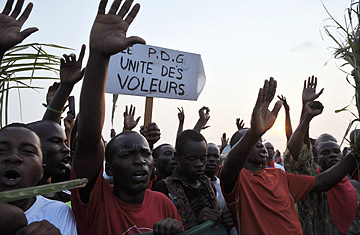
Supporters of opposition candidate Pierre Mamboundou
The angry and at times violent protests that broke out in Gabon on Thursday, Sept. 3, following the results of the Aug. 31 presidential election weren't fueled only by accusations that the contest had been rigged. A large portion of the fury was also focused on former colonial power France, which critics claim continues a long tradition of tolerating antidemocratic and repressive behavior by Africa's strongmen in exchange for their political and economic deference to Paris.
The situation appeared to be calming on Friday, after unrest had erupted in Gabon's cities the previous afternoon with the announcement that Ali Ben Bongo had won the election to succeed his father Omar Bongo, who died in June after having ruled the nation with an iron fist for 41 years. On Thursday, opposition supporters clashed with security forces in the capital, Libreville, while others in the main economic city of Port-Gentil ransacked shops, set fire to the French consulate and attacked the compound of French oil giant Total. Their grievances were clear: after having helped Omar Bongo squash his political opponents and allegedly siphon off a vast fortune from resource-rich Gabon's coffers, protesters say, French officials now stand idle as Ali Ben Bongo uses that money and inherited influence to steal a presidential election of his own.
"Because it's evident to anyone paying attention that this entire campaign has been marred by manipulation, cheating and now fraud, it's difficult not to interpret the benevolent silence from France as approving that process and outcome," says Marc Ona Essangui, a Libreville-based environmental activist and opponent of the Bongo regime. "France claims it didn't have a candidate in this election. France has always claimed it didn't have a candidate in Gabonese elections. And yet the ideal candidate for France has once again come out on top."
Blame it on Françafrique, the name given to the relationship between successive governments in Paris and the client regimes that arose across Africa as France swapped colonial control of nations in exchange for arrangements conducive to French political and business interests. For decades, Françafrique produced corrupt and brutal yet stable African partners for France and helped Paris fend off the rival influences of Britain, the U.S. and more recently China. Typically, the authoritarian African leaders who gained from this relationship grew magnificently rich as their people, inversely, became impoverished. And no ruler was more iconic of the so-called Big Men that Françafrique produced than Omar Bongo.
For that reason, the Bongo succession was viewed as a test of the repeated promises French President Nicolas Sarkozy has made to turn the page on Françafrique by treating African partners as equals — and allowing their voters to decide their destinies for themselves. "If you choose democracy, liberty, justice and law, then France will be with you to construct them," Sarkozy told a crowd of university students in Dakar, Senegal, in July 2007.
Easier said than done. The following year, Sarkozy replaced his minister dealing with developing nations after the official had infuriated Bongo by promising he'd "sign the death certificate" of Françafrique. Since then, Sarkozy has made several controversial visits to African nations, involving agendas like attending Bongo's funeral, that indicate Françafrique is still alive and well.
The fact that France has stayed silent in the face of loud claims in Gabon that Ali Ben Bongo's election victory, with 41.7% of the vote, was gained by fraud further suggests that Sarkozy is finding it easier to live with Françafrique than to end it. And he's not the only one. Just hours before the announcement of the election results on Thursday, French Foreign Affairs Minister Bernard Kouchner said he'd been in contact with Ali Ben Bongo and his two main rivals, all of whom were claiming victory. "I hope they will come to an arrangement as they always have in Gabon," said Kouchner, in what didn't exactly sound like a call for the principles of democracy to be respected.
Activist Ona says the Bongo family fortune allowed Ali Ben to finance ubiquitous advertisements in a lavish campaign that his opponents could never have come close to matching. Meanwhile, Ona notes, local and international observers have marveled at how more than 800,000 names were registered on voter rolls in a nation of only 1.3 million people — an astonishing increase of more than 200,000 voters from the last election, in 2005. "That this election was unfair isn't even an issue, but there's so much suspicion of fraud that France should be voicing concern or protesting if it were really serious about ending Françafrique," Ona argues.
In the Friday edition of the daily Libération, editorialist François Sergent agreed, urging France to end its "incestuous relations" with the African leaders it has connived with out of "mercantile and political interests." Harking back to Sarkozy's Dakar speech to students in which he promised France's aid in building real, lasting democracies, Sergent asks, Where is Paris now with such help for Gabon?
